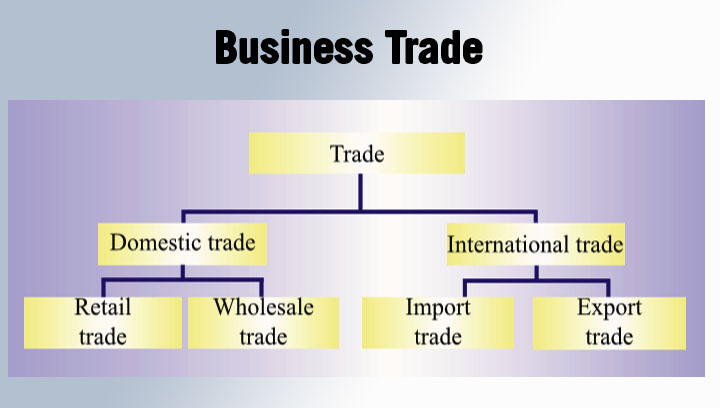Introduction to trade and supporting services
A business can simply be defined as any activity satisfying the needs and wants of humans. Trade is the most important activity carried out by a business among all other activities. In order to make trade easy and efficient, supporting services are essential. The supporting services and trade are mutually related i.e. supporting services facilitate the growth of trade and trade facilitates the growth of supporting services.
Business Trade
Trade means buying and selling goods and services. In simple terms, trade can be explained as the purchasing and selling of products. In trade, the ownership of a good is transferred from one party to another. This transfer occurs based on a monetary value.
Trade has expanded its scope into domestic and international areas. The categories of trade can be depicted as follows.
Domestic Trade
Trading activities that occur among different parties within a country are domestic trade. In domestic trade, payments can be made in the currency used in that country. Domestic trade occurs in different ways.
- Retail trade
- Wholesale trade
Retail trade
Consumers are required to purchase various goods and services in order to fulfill their wants. These goods are sold to them by the retailers. Accordingly, retail trade means selling goods and services for final consumption.
Example:-
- When a student buys the required exercise books from the school co-operative or from another trading shop, the trader has carried out a retail sale.
The person who carries out retail trades is known as a retailer. At present, there are both large and small-scale retail shops.
Characteristics of retail trade
Selling goods and services for final consumption
Supplying required goods in required quantities at the required time to consumers
Close proximity to consumers
- Retail shops are available in any area in order to facilitate consumers to fulfill their needs. Retail shops are located closely to consumers.
Providing a variety of goods
- Most of the retail shops sell various goods that fulfill the same need. Further more, at present there are retail shops that sell most of the goods required by a household.
Importance of retail trade
Retail trade is important as it provides the following services.
- Providing goods and services to consumers to fulfill their daily needs and wants
- Introducing new goods to consumers
- Providing goods on credit at times
- Supporting to improve the quality of goods by informing consumer feedback to producers
Types of retail traders
- Examples:- Supermarkets
- Examples:- Groceries, Beauty salons
- Retailers selling goods by visiting houses - Peddlers
- Retailers selling goods by traveling from fair to fair
- Mobile retail stores built on vehicles
Wholesale trade
- Selling 50 kilograms of rice to a retailer
- Selling a stock of cement to a contractor to construct a building
Characteristics of wholesale trade
- Purchasing goods for the purpose of reselling
- Often selling large quantities of goods in one transaction
- Selling a few selected items
- Unit selling price is relatively low
- Providing trade discounts i.e. reducing a certain percentage from the listed price of goods in a sale
Differences between retail trade and wholesale trade
Retail trade
- The objective of retail trade is to sell goods for final consumption.
- Retailers sell different types of goods by understating consumer needs and wants.
- Retail prices is comparatively higher since retailers have to incur additional costs to resale and have to earn a profit as well.
- Goods are often sold at the listed price.
- Retailers are well aware of the needs and wants of consumers, as they have direct contact with them.
Wholesale trade
- The objective of wholesale trade is to sell goods for the purpose of reselling.
- Sells only one or limited types of goods.
- The wholesale price is relatively lower compared to the retail price, as a result of selling in large quantities and trade discounts.
- Trade discounts are given in wholesale trade.
- Wholesalers do not have direct contact with consumers, they collect information about consumers, though retailers.
International trade
There are two categories of international trade.
Import trade
- Purchasing crude oil from Middle East countries
- Purchasing automobiles from India
Export trade
- Selling Sri Lankan tea to European countries
- Selling Sri Lankan apparel products to European countries









